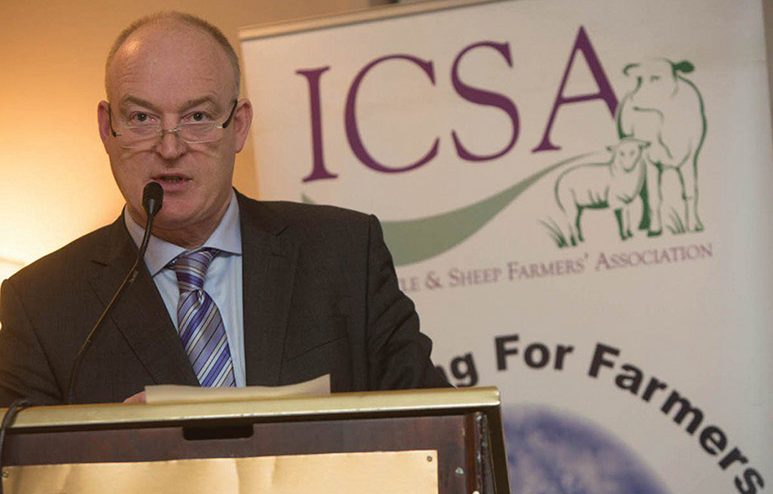
Now in his sixth year and final year as President of the ICSA, Patrick Kent continues to fight the good fight for farmers the length and breadth of the country. The issue of low farming incomes remains top of his list of priorities.
The Irish Cattle and Sheep Farmers’ Association emerged as a farming lobby group, specifically for cattle and sheep farmers following the 1992 MacSharry Reform of the CAP.
The farmers who began the development of ICSA identified a number of flaws and inequities introduced in the 1992 reform. These issues formed the basis of the ICSA policy objectives during the Agenda 2000 negotiations, through to the Fischler reforms of 2003 and continue to underpin our policies as CAP post 2013 negotiations progress.
One of ICSA’s biggest successes was the abolition of the coupled payments system for farm subsidies. Essentially, ICSA was the organisation that delivered the single payment – and it is now fighting to retain the maximum possible basic payment.
The Association – which has seen its membership grow to over 10,000 members – represent the interests of drystock and sheep farmers throughout every county in Ireland, with the national office located in Portlaoise, Co. Laois.
Back in 2013, New Ross, Co Wexford-based farmer Patrick Kent was elected president of the ICSA and was re-elected to serve a third and final term in December 2017.
“I am privileged to work with outstanding colleagues in the association; their dedication to defending the rights of farmers around the country is second to none and I am proud to be part of a great team,” he said following his re-election.
Now in the final year of his presidency, Patrick has led many campaigns over the past five years from opposition to TTIP and Mercosur deals to beef protests against unfair prices currently being paid to farmers.
He believes farmers should be recognised for the positive impact that pasture farming has on climate change, he is passionate about the creation of other income streams for farmers from carbon sequestration and on-farm renewable energy generation complete with proper financial incentives.
It’s a pretty time consuming role but Patrick has derived great satisfaction from serving the ICSA’s members and has no intention of letting the baton slip in his final year.
“It has been a very interesting time for me on a personal level and I’ve had the pleasure of meeting a lot of influential people,” he told Irish Tractor & Agri. “Being President of the ICSA is a responsible position and we have a responsibility to represent all of our members that we take very seriously. We have to address their concerns by bringing them to the attention of of the powers that be and the policy makers.
“Throughout my term to date I have had the pleasure of meeting so many farmers and seeing first-hand the commitment they have to their businesses. I have been in and out of Brussels a lot and there is a constant amount of lobbying the President has to do in and around Kildare Street as well. You also have keep ahead of all the research that is going on and attend plenty of conferences and meetings. There is a lot of work involved but it has been an enjoyable period for me and I’m looking forward to seeing out my final year.”
What are the challenges that ICSA members face at this point in time? “They’re ever increasing!” Patrick replied instantly. “Incomes are diluting, there is pressure to increase output and not be rewarded for it. That is a huge issue that has to be addressed.
“A farmer in his or her 50s or 60s is being asked to jump and they are expected to say how high. Putting farmers into vertical integration systems of production is codology and has to be addressed.
“We’re producing high quality food here in Ireland and Bord Bia has a responsibility to promote quality healthy food, not low grade factory produced food.
Patrick – who operates a mixed enterprise of cattle, sheep and thoroughbred national hunt horses – was inducted into the National Hall of Fame for Livestock Breeding last year having been nominated for the award by Belgian Blue Cattle Society.
He first became acquainted with the Belgian Blue breed in the mid 1980’s. In 1988 he purchased a breeding heifer from the Debiert herd in Belgium which became the foundation female of the Aclare Herd.
He gave up showing because it was “too time consuming” and channelled all his energies into the ICSA.
“We have got to stop mass production,” he insisted. “Grass produced, grass fed and GM free is the aim. We have taken GM out of the diet and that is a positive step forward. Ireland has an advantage because it is an island country. Our grass is more nutritious and we have a higher standard of produce as a result.
“Very few countries in the world can compete with us in that regard and that is a very strong unique selling point we have in our favour.
“We are always looking to maximise the price for dairy, beef and sheep,” he added. “Hopefully, Brexit will not put too big a spanner in the works but it’s difficult to say at this point in time. Having said that, I’m a firm believer that the right product can be sold on any market in the world.”
Taken from Irish Tractor & Agri magazine Vol 7 No 2, April/May 2019